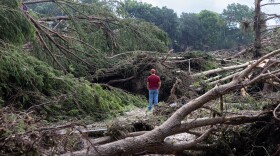-
Scattered outages have been reported as of Monday, but there are no signs of the widespread generation failures that crippled the grid nearly five years ago.
-
Texas is preparing for the coldest temperatures of the season, and forecasters are warning of possible power outages and icy roads in much of the state.
-
A local weather phenomenon holds that the 6,100-person town of Tonganoxie, Kansas, can weaken and divide thunderstorms and tornadoes. Experts are mixed on its existence — and what causes it — but locals say otherwise.
-
During a Friday state hearing, parents of July 4 flood victims said camps should prioritize the safety even if costs are high.
-
High winds and heavy rainfall cause some trees to topple over, causing property damage and, occasionally, injuries. Scientists at the University of Oklahoma will spend the next four years working with communities on mitigating that hazard.
-
If this summer's special sessions were a midterm exam on disaster preparation, Texas lawmakers would probably get an A. But their final grade will depend on how changes are actually implemented — and how quickly that happens.
-
The National Weather Service extended its flood watch until 9 p.m. Tuesday for several areas across Texas, including Kerrville.
-
A crisis communication expert says everyday notifications are weakening the impact of life-saving emergency alerts.
-
Severe weather has gripped Texas this year — from tornadoes tearing through the South Plains to wildfires in the Panhandle and, most recently, deadly floods in the Hill Country. In Lubbock, where the city's outdoor siren system was activated for the first time earlier this summer, emergency officials emphasize that layered alerts and personal preparedness remain essential to staying safe.
-
As searchers continue to look for victims in the deadly flash flooding in Texas, officials are answering questions about the weather forecasts ahead of and during the storm.

Play Live Radio
Next Up:
0:00
0:00
Available On Air Stations










